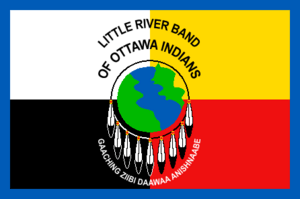Little River Band of Ottawa Indians facts for kids

Flag of the Little River Band of Ottawa Indians.
|
|
| Total population | |
|---|---|
| Enrolled members: 4,232 in July 2015 | |
| Regions with significant populations | |
| Languages | |
| English, Ojibwe (Ottawa dialect) | |
| Religion | |
| Traditional Tribal Religion -and- Christianity | |
| Related ethnic groups | |
| Potawatomi, Ojibwe (Council of Three Fires) |
The Little River Band of Ottawa Indians (called Ojibwe: Gaaching-Ziibi Daawaa Anishinaabe in their own language) is a Native American tribe. They are officially recognized by the United States government. This tribe is based in the Manistee and Mason counties of northwest Michigan. They were recognized on September 21, 1994.
They are one of three federally recognized Ottawa tribes in Michigan. The others are the Little Traverse Bay Bands of Odawa Indians and the Grand Traverse Band of Ottawa and Chippewa Indians. Other Ottawa groups are in Oklahoma and Canada. Historically, they spoke the Odawa language, which is a dialect of Ojibwe. However, fewer people speak this language today.
Contents
History of the Tribe
The area around the Manistee River was home to Ottawa and Chippewa (Ojibwe) people for a very long time. This was before Europeans came to live there. French fur traders visited their villages many years ago.
In 1836, the Ottawa people made a treaty, or agreement, with the United States government. This treaty set aside land for them along the Manistee River. This land was part of their traditional home. The treaty said they would have this land for five years. It also planned for them to move west.
However, a new treaty was made in 1855. This new agreement gave the tribe a reservation in Mason and Oceana counties. In August 2000, the Little River Band bought back about 740 acres of this land in Mason County. This brought some of their historic land back under tribal ownership.
The Little River Band of Ottawa Indians is one of many federally recognized tribes in the United States. On September 21, 1994, the U.S. government officially confirmed the tribe's status. President Bill Clinton signed a law to make this happen.
Since January 1994, the Little River Band has published a monthly newspaper called Currents. You can find all past issues on the tribe's official website.
How the Tribe is Governed
The Little River Band is a successor to nine of the 19 historic Grand River Bands of Ottawa people. These groups lived along several rivers in Michigan. The Little River Band has its own government, which is set up like the U.S. government. It has three main parts:
- The executive branch
- The legislative branch
- The judicial branch
The tribe holds regular elections. They elect a nine-member legislative council. They also elect an Ogemakaan, which is their Elected Chief. The judicial branch is separate but equal to the other two. The government has 28 different departments. These departments run programs and services needed for a modern government.
Who Can Be a Member
The Tribal Council has rules for who can become a member of the tribe. These rules are based on family history and connection to the historic bands of the region. To be eligible, a person must have a certain amount of Native American heritage. They must also be a direct descendant of a Native American from specific Michigan counties. These ancestors must have been listed on official rolls from the past. A person cannot be enrolled in another tribe to join. Children under 18 can also become members if they meet the family history rules.
The Tribe's Language
The Little River Band's original language is Anishinaabemowin. This is an Algonquian language. In 2010, United Nations Educational, Scientific and Cultural Organization (UNESCO) said this language was "critically endangered." This means very few people, mostly elders, can still speak it fully. Many tribal members live far from the reservation. They live among people who mostly speak English, so the language is not used often.
Little River Casino Resort
On December 3, 1998, Governor John Engler signed an agreement with the Little River Band. This agreement allowed the tribe to have gaming (like casinos) on their reservation land. Tribal member Robert Guenthardt led these efforts. He later became the tribe's first elected Ogema.
In 1999, the Band opened the Little River Casino Resort on their Manistee Reservation. Since then, the resort has grown a lot. It now has over 23,000 square feet of space. The complex includes a large hotel with 292 rooms. It also has an event center that can hold 1,700 people. The casino offers many slot machines and table games. The tribe uses the money from the casino to help their economy grow. They also use it to support the well-being of their people.
Notable people
 | Emma Amos |
 | Edward Mitchell Bannister |
 | Larry D. Alexander |
 | Ernie Barnes |

